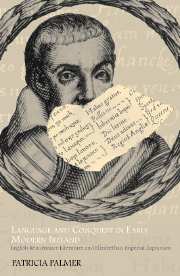 Language and Conquest in Early Modern Ireland
Language and Conquest in Early Modern Ireland Book contents
- Frontmatter
- Contents
- Acknowledgements
- List of abbreviations
- Introduction
- Chapter 1 Conquest, colonial ideologies and the consequences for language
- Chapter 2 ‘A bad dream with no sound’: the representation of Irish in the texts of the Elizabethan conquest
- Chapter 3 ‘Wilde Speech’: Elizabethan evaluations of Irish
- Chapter 4 ‘Translating this kingdom of the new’: English linguistic nationalism and Anglicisation policy in Ireland
- Chapter 5 New world, new incomprehension: patterns of change and continuity in the English encounter with native languages from Munster to Manoa
- Chapter 6 The clamorous silence
- Conclusion
- Glossary
- Notes
- Bibliography
- Index
Chapter 2 - ‘A bad dream with no sound’: the representation of Irish in the texts of the Elizabethan conquest
Published online by Cambridge University Press: 22 September 2009
- Frontmatter
- Contents
- Acknowledgements
- List of abbreviations
- Introduction
- Chapter 1 Conquest, colonial ideologies and the consequences for language
- Chapter 2 ‘A bad dream with no sound’: the representation of Irish in the texts of the Elizabethan conquest
- Chapter 3 ‘Wilde Speech’: Elizabethan evaluations of Irish
- Chapter 4 ‘Translating this kingdom of the new’: English linguistic nationalism and Anglicisation policy in Ireland
- Chapter 5 New world, new incomprehension: patterns of change and continuity in the English encounter with native languages from Munster to Manoa
- Chapter 6 The clamorous silence
- Conclusion
- Glossary
- Notes
- Bibliography
- Index
Summary
You're a bloody English bags, says your man in Irish.
Flann O'Brien, At Swim-Two-Birds, p. 86Matched against the general volubility of Irish history, the Elizabethan conquest can seem strangely silent. It is visually arresting – Derricke's wood-kern feasting in the bracken, the half-dead crawling out of the woods and ‘glyns’ after the Desmond rebellion, the 500 ‘goodly personages’ lying slain on a small promontory at Smerwick – but the picture is transmitted largely without sound. The sound of voices speaking Irish is scarcely heard at all. There is an outflow of Views, Discoveries, Descriptions, Images, Platts, Anatomies but, as the relentlessly visual register of these titles insists, Irish-speakers are looked at rather than heard. Their story is told almost without quotation marks.
This chapter examines how Englishmen serving in Ireland between roughly 1558 and 1607 represented the Irish language in their writings. The Spanish-American material reviewed above might lead us to expect that language would be foregrounded by the encounter, that the indigenous tongue would loom large both as a material reality and as a category for evaluating – and disparaging – the other. Coming to these texts from the linguistic excitement of the Spanish conquista, we are altogether unprepared for the silence that meets us. We pass from a discourse where language was over-determined to one where it is blanked out.
Late sixteenth-century Ireland was, as the English writers chronicling it complained in chorus, endlessly ‘clamorous’. Most of that clamour was made as Gaeilge.
- Type
- Chapter
- Information
- Language and Conquest in Early Modern IrelandEnglish Renaissance Literature and Elizabethan Imperial Expansion, pp. 40 - 73Publisher: Cambridge University PressPrint publication year: 2001


